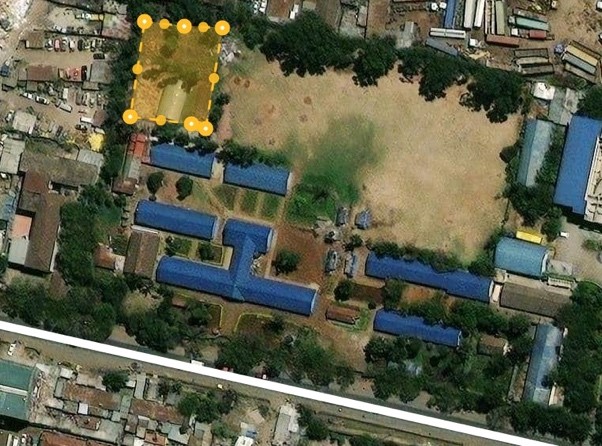by Allan C'oredo, Awesome Blossoms Project Manager
Co-writer: Leslie Janoe, AWC Amsterdam
Background
Mathare, an informal settlement in Nairobi, Kenya, with a population of over 500,000 residents, faces environmental and nutritional challenges due to its lack of basic amenities, including poor air and water quality, inadequate access to green spaces, and a lack of sustainable agriculture. To address these challenges, urban sustainable agriculture, particularly hydroponics farming, has emerged as a critical tool in the area. However, a lack of access to land, knowledge and skills, and infrastructure and resources for proper waste management and recycling pose significant challenges in promoting sustainable agriculture in Mathare. The Awesome Blossoms project is working to address these challenges by providing training, resources and education to promote sustainable agriculture in the area.
Partnership with Schools
Safe Spaces’ Awesome Blossoms sustainable urban farming project will be partnering with three schools. Why is this important? With space so limited in Mathare, school grounds are some of the few places where there is room to grow crops. By using hydroponics systems, Awesome Blossoms will be able to create farms that produce nutritious organic vegetables in minimal space using minimal water. The farms at each of these schools will have 500 gardens: 400 gardens to support Safe Spaces girls’ education and empowerment programs, 50 gardens to provide income and vegetables for 25 women micro-entreprenuers from the community, and 50 gardens to supply vegetables to the school lunch programs.
As rent, Awesome Blossoms provides each school with 50 verticle garden systems and the seeds, nutrients and other organic inputs needed. Safe Spaces harvests the vegetables from these gardens and gives them to the school for their school lunch program.
We gained insight into the impact this partnership can have during the pilot project. Judith Adel, Head Teacher of Destiny Education Centre, said, “We are very lucky to have these hydroponics gardens here. It supplements the meals for our children. The feeding program that we have now is often the only meal that the children have. These vegetables feed 350 children. With the supplements from greens, we are going to help them have a balanced diet.”
The children get to experience going into the gardens. Edwin, a teacher from from Kiboro Primary School said “When children look at these crops, they feel responsible because this is some of what they eat at home. They really like it because they know that this is for us all. They want to see these crops being havested. They want to see the outcomes of the crops.”
Farm Locations
Agreements have been finalized with two of the three schools where Awesome Blossoms farms will be created. You can see the yellow outlined areas where the farms will be installed.
 OUR LADY OF MERCY SHAURI MOYO (PRI)
OUR LADY OF MERCY SHAURI MOYO (PRI)
The total area provided by the school for Awesome Blossoms Project is 0.79 ha for Our lady of Mercy Shauri Moyo and 0.15 ha for St. Bridgit Primary. We are still in talks with one school that hasn’t signed a contract yet, so we cannot provide their details at the moment.
 St. Bridgit Primary
St. Bridgit Primary
Nairobi has a subtropical highland climate with average annual temperature around 19–20°C (66–68°F). It has two rainy seasons: March to May and October to December. The annual rainfall is around 790 mm (31 inches), with most falling during the rainy seasons. The dry season, from June to September, is cooler with low humidity and clear skies. Both Shauri Moyo and St. Bridgit have reliable access to an adequate road network, as well as access to water sources through piped water from the Nairobi City Council and borehole water. Additionally, both areas have access to reliable and affordable electricity.
Shauri Moyo Primary School was established in 1929 as a government school for African children in Nairobi. The school has faced challenges with overcrowding and limited resources, but efforts have been made to address these issues, including the construction of new classrooms. The school remains an important institution in the community, providing education to over 950 girls from diverse backgrounds.
St. Bridgit Primary School is a public school located in the Mathare slum in Nairobi, Kenya, established in 1993 to provide education for children who were not attending school. The school has over 1,000 students in 16 classrooms and strong academic and extracurricular activities, but it has faced challenges of overcrowding and limited resources. However, the school has improved through community support, new facilities, computer labs, teaching methodologies and farms. Safe Spaces is working to increase nutrition uptake and environmental knowledge through their hydroponic farms. The Awesome Blossoms farms will produce fresh, organic vegetables that are used in school lunch programs and distributed to the community to promote healthy eating habits and provide access to nutritious produce. The organization also will provide nutrition and environmental education to schools and the community, teaching about the benefits of healthy eating and sustainable farming practices. Community outreach and afterschool programs will be used to raise awareness of the importance of sustainable farming and inspire individuals and communities to adopt eco-friendly practices that benefit the environment and their communities. Through partnerships with schools and the community, the Safe Spaces Awesome Blossoms project is creating a nutritional and environmentally sustainable ecosystem.

